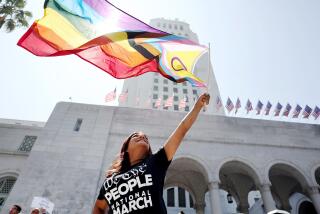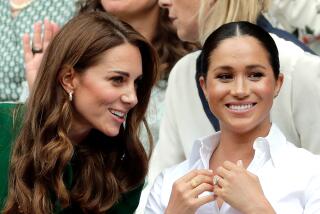Majority in U.S. Support Tabloid Boycott in Wake of Diana’s Death
- Share via
Emerging from a week of mourning for Princess Diana, Americans wholeheartedly endorse boycotting the tabloids until they rein in obnoxious photographers--who most believe have exceeded their constitutional rights to pursue celebrities, a Los Angeles Times Poll has found.
Yet Americans do not assign blame for the popular princess’ death solely to the paparazzi who hunted her down. Rather, they point to a coincidence of factors, particularly the driver behind the wheel of the car in which she was fatally injured, who prosecutors say was drunk.
The poll, which surveyed 1,258 adults across the nation Sept. 6-9, illustrated the wide swath Diana cut through this nation’s heart.
All groups--men, women, young, old, black and white--said they were affected by her death.
“What shone was her benevolence, her good works, her humanitarianism, her devotion to her sons,” said Susan Pinkus, director of the Los Angeles Times Poll. “And also, she died too young.”
However sympathetic Americans are, they do not precisely replicate the outrage that Britons have demonstrated against photographers in the days since Diana’s death.
The paparazzi are clearly unpopular here. Three of every four Americans said they believe that those aggressive photographers are going beyond their constitutional rights in so actively pursuing their prey. Only 20% defended them as working within the law.
The majority included liberals, usually stout defenders of constitutional rights. Two-thirds of those on the political left said the paparazzi were wrong, with 33% supporting their rights.
The overwhelming support for a boycott of the tabloid press until they curb the buying of salacious photos confirmed that sentiment.
Overall, 69% of Americans favor a boycott, and 56% characterized their support as “strong.”
Separately, 85% said tabloid newspaper editors should refuse to purchase paparazzi film until the photographers behave in a civil fashion.
“I would like to see the tabloids slapped down,” said Becky Shepherd, 23, of Greensburg, Ind. But she was hardly optimistic. “Nobody has the self-confidence to stay away--they would rather hear the rumors.”
Shepherd said she does not read the tabloids--”I find them stupid”--and most Americans concurred.
Only 5% said they read the tabloids regularly; 75% said they had never picked up the check stand staples.
A distaste for the tactics of tabloid journalism, however, did not translate into outright blame for the princess’ death.
While the photographers trailing the princess on the night of the crash were initially blamed for her death, French police have since confirmed that the driver of the princess’ car, Henri Paul, was legally drunk. That was enough to shift responsibility at least partly away from the paparazzi, according to Americans.
Asked whether the photographers, the driver, the tabloid editors or the tabloid-buying public were responsible for Diana’s death, 45% said all of those factors were to blame. Another 25% cited the driver, and a comparatively small 14% blamed the photographers. Only 3% blamed the editors, and 2% blamed the public.
The only groups that differed from the general reaction were young people and African Americans. A higher 39% of both groups blamed the driver.
Like many, William Plymale, 75, said he was heartsick about the princess’ death.
“The royals, the tabloids, everybody mistreated her,” said the retired exterminator from Daytona Beach, Fla. “They are all responsible.”
Plymale described the reaction to Diana’s death as unlike anything he had seen, including the aftermath of World War II and the assassination of President John F. Kennedy.
That Diana found favor not only among her own countrymen but in the hearts of diverse Americans illustrated the reach of her popularity.
Overall, seven in 10 Americans said they were affected by her death, either “a lot” or somewhat.
The impact was particularly pronounced among women and older Americans.
Almost two in five women, or 39%, said they were greatly affected by the death, compared with 18% of men.
Similarly, 40% of those 65 and older, and 36% of those ages 45 to 64, said they were affected a lot. A smaller 17% of those ages 17 to 29 and 25% of those ages 30 to 44 were so moved.
There were virtually no differences among white and black Americans, or among different political ideologies--testament, perhaps, to the princess’ attempt to breach racial and cultural divides.
When asked why her death had affected them, Americans most often cited her generosity.
Twenty-five percent said she was a “humanitarian,” and 11% cited her charitable work. One-fifth--21%--said she was a “good person” and 19% said she was a good mother to Princes William and Harry.
Among women particularly, it seemed not to matter that the rich and aristocratic princess, raised in manors and finishing schools, shared little in terms of background with everyday Americans. It seemed, some said, as if she was living their life.
(BEGIN TEXT OF INFOBOX / INFOGRAPHIC)
THE TIMES POLL: Princess Diana’s Death
How much did the death of Princess Diana affect you?
A lot: 29%
Some: 42%
Not too much: 19%
Not at all: 10%
****
Why did her death affect you?*
She was a humanitarian: 25%
She was a good person: 21%
She was a good mother: 19%
The tragic was she died: 14%
She died so young: 12%
****
In America, do you think the paparazzi who pursue celebrities are acting within their constitutional rights of free speech or not?
Gone beyond their rights: 75%
Within their rights: 20%
Don’t know: 5%
****
Who is more responsible for the death of Princess Diana?
Driver: 25%
Paparazzi : 14%
Tabloids that buy the photos: 3%
The public who buy the tabloids: 2%
Prince Charles (volunteered): 1%
Other: 3%
All equally: 45%
None of them: 1%
Don’t know: 6%
Times poll data was also available on the World Wide Web at: https://www.latimes.com/HOME/NEWS/POLLS
* Note: Asked of those who said they were affected some or a lot. Up to two replies were accepted. Numbers do not add up to 100% because of multiple replies and because only the top five answers are shown.
(BEGIN TEXT OF INFOBOX / INFOGRAPHIC)
How the Poll Was Conducted
The Times Poll contacted 1,258 adults nationwide by telephone Sept. 6 through Sept. 9. Telephone numbers were chosen from a list of all exchanges in the nation. Random-digit dialing techniques were used so that listed and unlisted numbers could be contacted. The sample was weighted slightly to conform with census figures for sex, race, age, education and region. The margin of sampling error for all adults is plus or minus 3 percentage points; for certain subgroups the error margin may be somewhat higher. Poll results can also be affected by other factors such as question wording and the order in which questions are presented.
More to Read
Sign up for Essential California
The most important California stories and recommendations in your inbox every morning.
You may occasionally receive promotional content from the Los Angeles Times.














